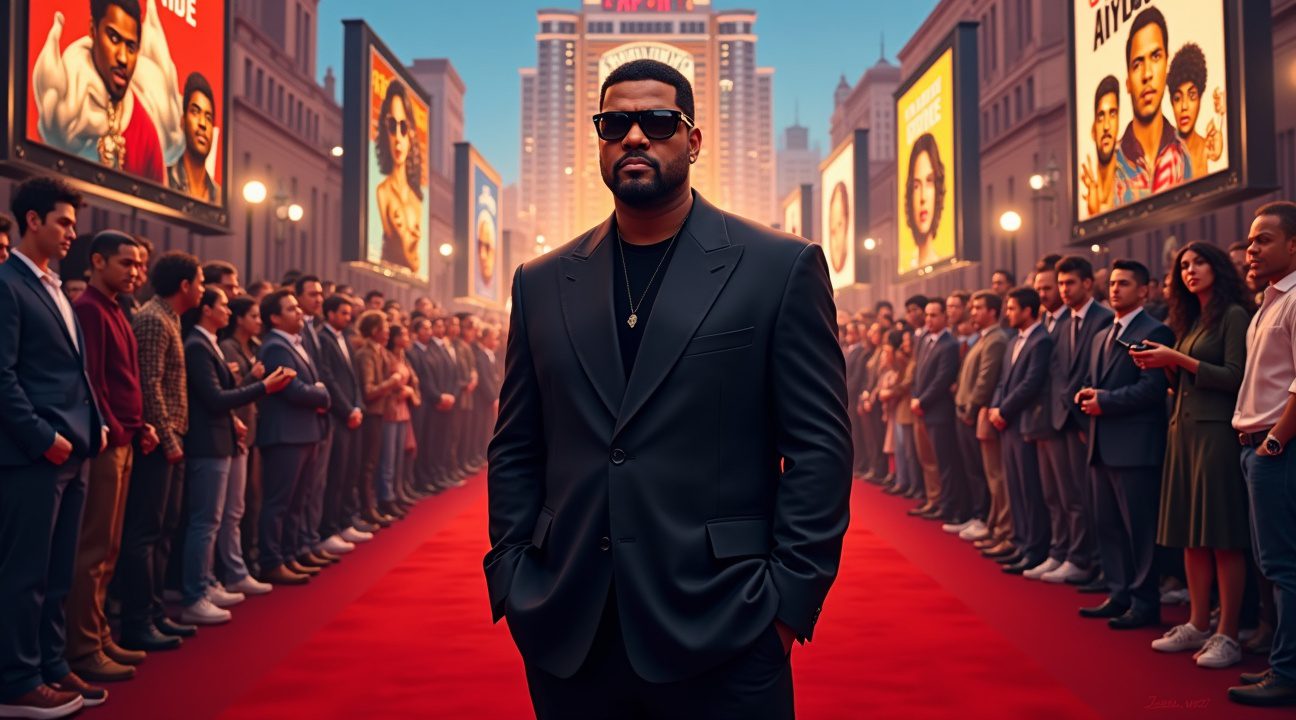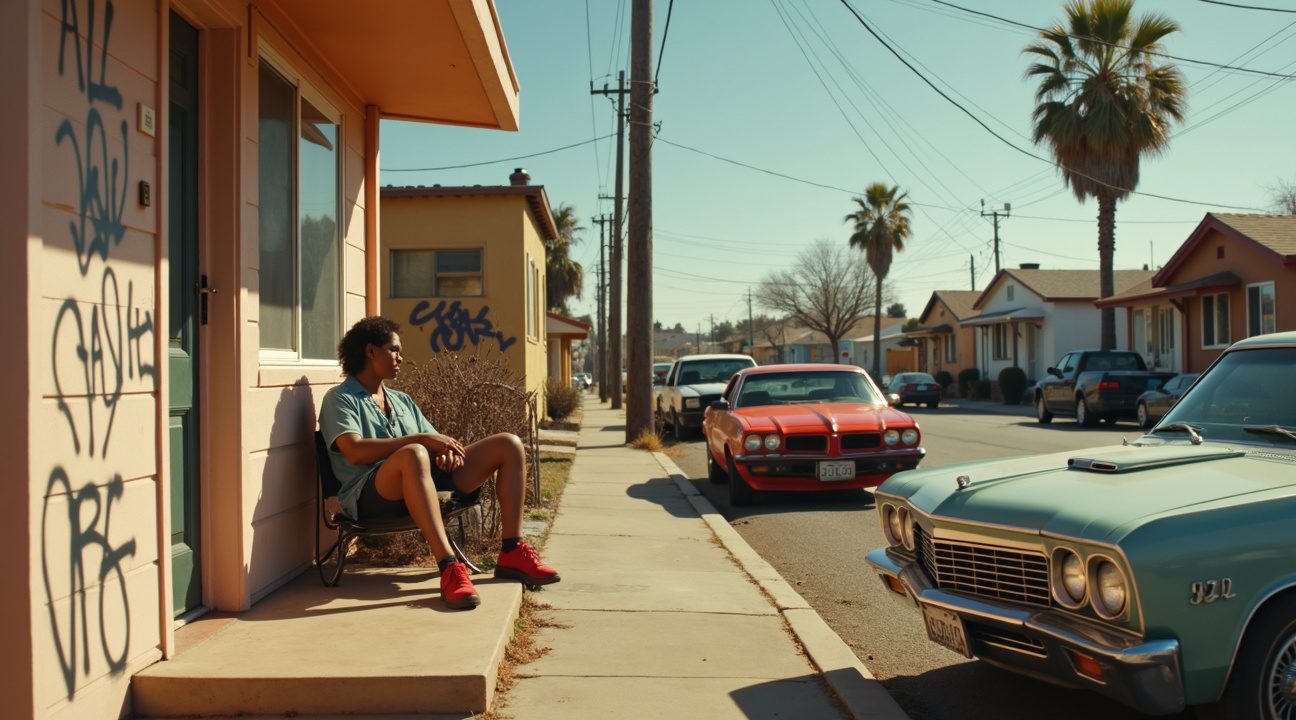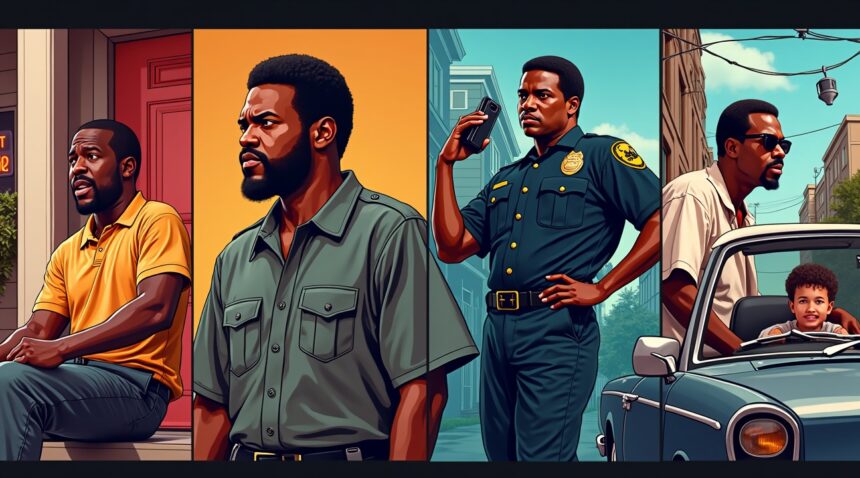Ice Cube’s journey from a hardcore rapper to one of Hollywood’s most dependable comedy performers is a remarkable evolution, backed by impressive box office success and cultural impact.
Key Takeaways
- Ice Cube has starred in more than 40 films, with his comedic projects contributing to over a billion dollars in worldwide revenue, solidifying his position as a bankable star in the genre.
- The Friday trilogy (1995–2002) kickstarted his comedy career and became a cultural landmark. Ice Cube co-wrote the original film to ensure it captured authentic urban humor that resonated with diverse audiences.
- His portrayal of Captain Dickson in the 21 Jump Street franchise highlighted his comedic timing and presence. The films collectively earned more than $530 million globally and demonstrated his strength in supporting roles.
- The Barbershop series showed his proficiency in ensemble storytelling, blending humor with insightful social commentary set against the backdrop of a community barbershop—a modern cultural hub.
- Ice Cube has proven adaptable across various comedy subgenres such as family comedies, buddy cop escapades, and action-comedy hybrids. This adaptability has allowed him to avoid typecasting and build lasting franchises, including collaborations with stars like Kevin Hart.
The Evolution of a Multi-Talented Star
From his early days in N.W.A. to headlining successful family-oriented films like Are We There Yet?, Ice Cube has demonstrated a keen understanding of audience shifts and market trends. By staying true to his voice while diversifying his roles, he has managed to transition smoothly without alienating longtime fans.
Maintaining Cultural Relevance
Through franchises such as Barbershop and Friday, Ice Cube continues to contribute to narratives that spotlight African American communities while delivering mass-market entertainment. His work underscores how comedy can serve as a vehicle for both laughter and reflection.
In the ever-changing landscape of Hollywood, Ice Cube stands as a powerful example of strategic reinvention, leveraging humor, authenticity, and business savvy to redefine what it means to be a crossover star.
From Friday to Jump Street: How Ice Cube Became Hollywood’s Most Bankable Comedy Star
Ice Cube’s transformation from hardcore rapper to one of Hollywood’s most reliable comedy performers represents a remarkable career evolution that spans decades and demonstrates the power of reinvention in entertainment. His journey illustrates how an artist can successfully transition between genres while maintaining authenticity and commercial appeal.
The numbers don’t lie when it comes to Ice Cube’s comedy credentials. He’s appeared in over 40 films throughout his career, with his highest-grossing comedies proving that audiences consistently connect with his particular brand of humor. His films have collectively grossed over a billion dollars, establishing him as a truly bankable comedy star who can deliver both critical and commercial success.
Box Office Dominance Across Multiple Comedy Franchises
Ice Cube’s comedy portfolio showcases impressive financial returns that studio executives can’t ignore. The 21 Jump Street reboot earned $201.6 million worldwide against a production budget of just $50 million, proving that his appeal extends beyond traditional demographics. The sequel, 22 Jump Street, outperformed its predecessor with a box office total of $331 million, cementing the franchise’s success and Ice Cube’s role as a key component in that achievement.
Earlier in his comedy career, Barbershop (2002) demonstrated his ability to anchor ensemble pieces while delivering substantial returns. The film made $77.1 million worldwide on a modest $12 million budget, representing the kind of return on investment that makes studios take notice. Similarly, Are We There Yet? (2005) grossed around $98 million worldwide, showing his capacity to carry family-friendly content that appeals to broader audiences.
These figures highlight how Ice Cube has consistently chosen projects that balance creative fulfillment with commercial viability. His comedy roles often feature him as the straight-man or the exasperated authority figure, allowing his natural charisma and timing to shine while supporting ensemble casts that include action comedy veterans and emerging talent alike.
Ice Cube’s success in comedy extends beyond just financial metrics. His presence in these films often brings credibility and authenticity to projects that might otherwise feel manufactured. Whether he’s dealing with incompetent police partners or managing family chaos, his performances feel grounded in real emotion rather than forced comedic situations.
The actor’s ability to transition seamlessly between different comedy subgenres sets him apart from many of his contemporaries. He’s equally comfortable in buddy cop comedies, family adventures, workplace ensemble pieces, and animated projects. This versatility has kept him relevant across multiple decades and allowed him to work with diverse casts and creative teams.
His comedy success has also contributed to important conversations about Hollywood diversity and representation. By consistently delivering box office hits, Ice Cube has helped prove that diverse casting and storytelling can be both financially successful and culturally significant. His films often feature multicultural casts and address themes that resonate with underrepresented communities while maintaining broad appeal.
The impact of his comedy career extends to inspiring other artists from hip-hop backgrounds to explore acting opportunities. Ice Cube’s success has shown that musical artists can successfully transition to film without abandoning their authentic voice or compromising their artistic integrity.
His approach to comedy selection appears strategic rather than random. Rather than taking any available role, he’s consistently chosen projects that allow him to showcase different aspects of his personality while maintaining the core elements that audiences expect from his performances. This careful curation has resulted in a comedy filmography that feels cohesive despite spanning various subgenres and target demographics.
The continued popularity of his comedy films in streaming and home video markets further demonstrates their lasting appeal. These projects continue generating revenue years after their theatrical releases, contributing to his status as a reliable performer whose work maintains commercial value over time.

The Friday Phenomenon That Started It All
Ice Cube’s transition from hardcore rap to comedy found its perfect vehicle in Friday (1995), a film that would forever change his career trajectory and establish him as one of comedy’s most authentic voices. Playing Craig Jones alongside Chris Tucker’s unforgettable Smokey, Ice Cube crafted a character that felt genuine rather than forced, bringing street-smart humor to mainstream audiences without compromising his credibility.
Building a Comedy Empire
The original Friday captured lightning in a bottle, following Craig and Smokey through one eventful day in South Central Los Angeles as they scramble to pay off a dangerous debt. Ice Cube didn’t just star in the film; he co-wrote the screenplay, ensuring the dialogue and situations rang true to his experiences. This authenticity helped Friday earn a 7.2/10 IMDb rating and a ‘Fresh’ rating on Rotten Tomatoes, proving that urban comedy could resonate with both critics and audiences.
Success naturally led to expansion.
- Next Friday (2000)
- Friday After Next (2002)
These films continued Craig’s adventures, introducing Mike Epps as the scene-stealing Day-Day. While these sequels generally performed better with fans than critics, they solidified the trilogy’s place in comedy history. Each installment maintained Ice Cube’s commitment to portraying real neighborhood dynamics with humor rather than ridicule.
Cultural Impact and Legacy
The Friday trilogy transcended typical comedy boundaries to become a foundational pillar of urban cinema. Ice Cube’s Craig Jones became an everyman hero, dealing with relatable problems like unemployment, family drama, and neighborhood politics. The films generated countless catchphrases and memes that continue circulating decades later, demonstrating their lasting cultural relevance.
This success opened doors for other comedy projects, much like how Good Burger 2 builds on nostalgic comedy foundations. The franchise’s cult following remains passionate, constantly requesting updates on rumored fourth installments. While discussions about another Friday film continue as of July 2025, no confirmed production date exists yet.
Ice Cube’s Friday phenomenon proved that authentic storytelling could create comedy gold. The trilogy established him as more than just a rapper-turned-actor; it positioned him as a authentic voice who understood how to mine humor from everyday struggles without losing respect for his community or his craft.

Captain Dickson Steals the Show in 21 Jump Street Success
Ice Cube found the perfect comedic vehicle with his portrayal of Captain Dickson in the 21 Jump Street franchise, transforming from supporting character to scene-stealing force across two wildly successful films. Playing the tough, no-nonsense police captain who oversees undercover operations, Ice Cube brought his signature deadpan delivery and intimidating presence to create one of modern comedy’s most memorable authority figures.
The original 21 Jump Street in 2012 proved that adapting an 80s TV series could work when done with the right mix of action-comedy and self-aware humor. With a modest $50 million budget, the film earned an impressive $201.6 million worldwide, establishing Ice Cube’s Captain Dickson as the perfect foil to Jonah Hill and Channing Tatum’s bumbling undercover duo. His sarcastic barbs and explosive outbursts provided the perfect counterbalance to the leads’ chemistry, creating a dynamic that audiences couldn’t get enough of.
Sequel Success and Expanded Role
22 Jump Street elevated Ice Cube’s role significantly, giving Captain Dickson increased screen time and more opportunities to showcase his comedic timing. The sequel’s massive success—earning $331 million worldwide and outgrossing the original—demonstrated how much audiences appreciated Ice Cube’s contribution to the franchise. His character evolved from simply being the angry boss to becoming a major comedic highlight, delivering some of the sequel’s biggest laughs through his reactions to the chaos around him.
The police comedy format allowed Ice Cube to play with expectations, using his intimidating real-world persona to create humor through contrast. While other comedy franchises have struggled with sequels, the Tropic Thunder 2 rumors show how difficult it can be to recapture lightning in a bottle twice.
Captain Dickson became such a fan favorite that discussions of a third film often centered on how much screen time Ice Cube would receive. His ability to generate laughs through sheer intensity and perfectly timed reactions proved that he didn’t need to abandon his tough-guy image to succeed in comedy—instead, he weaponized it for maximum comedic effect. The 21 Jump Street films remain among the most successful R-rated comedies of the 2010s, with Ice Cube’s Captain Dickson serving as a crucial ingredient in their formula for success.
Building Community Through Laughter in the Barbershop Series
Ice Cube’s portrayal of Calvin Palmer in the Barbershop franchise represents one of his most significant contributions to comedy cinema. The original 2002 film brought together an impressive ensemble cast featuring Cedric the Entertainer, Eve, and Anthony Anderson, creating a vibrant community space that resonated with audiences across different backgrounds. Calvin Palmer’s character serves as the anchor for a neighborhood institution where humor becomes the vehicle for exploring deeper social issues.
The financial success of the franchise speaks to its broad appeal, with the original Barbershop earning $77.1 million worldwide against a modest $12 million budget. This remarkable return on investment demonstrated that audiences craved authentic stories about African American community life, particularly when delivered through Ice Cube’s distinctive blend of comedy and gravitas. The success paved the way for Barbershop 2: Back in Business in 2004 and the long-awaited third installment, Barbershop: The Next Cut, which arrived in 2016 after a twelve-year gap.
Cultural Impact Beyond Entertainment
The Barbershop series distinguishes itself by using the Chicago barbershop setting as more than just a backdrop for laughs. Each film weaves social commentary into its comedic framework, addressing issues that affect urban communities while maintaining an entertaining atmosphere. Ice Cube’s Calvin Palmer becomes a reluctant guardian of tradition, struggling with the decision to sell his inherited business while recognizing its importance to the neighborhood’s fabric.
The franchise’s influence extended beyond the main trilogy, inspiring the spin-off Beauty Shop and establishing a template for community-centered comedies. These films demonstrate how comedy can serve as a bridge between entertainment and meaningful dialogue about cultural identity, economic challenges, and generational differences. The barbershop functions as a microcosm where characters from different walks of life converge, much like how Rush Hour 4 brings together diverse characters for both action and comedy.
Ice Cube’s performance throughout the series showcases his ability to balance comedic timing with dramatic moments, particularly when Calvin faces decisions that could impact his community’s gathering place. The character’s evolution across the films reflects broader themes about preserving cultural institutions while adapting to changing times. This approach has influenced other comedies that blend humor with social awareness, including projects like animated series that tackle mature themes through accessible formats.
The barbershop setting itself becomes a character in these films, representing a safe space where honest conversations can occur alongside playful banter. Ice Cube’s Calvin serves as the mediator between different perspectives, often finding himself caught between profit and principle. This dynamic creates natural comedic tension while addressing real concerns about gentrification, business ownership, and community preservation.
The ensemble nature of these films allows Ice Cube to showcase his collaborative comedy skills, working alongside established comedians and emerging talents. His interactions with Cedric the Entertainer’s character create some of the franchise’s most memorable moments, proving that Ice Cube’s comedy works best when he’s part of a larger community rather than carrying the humor alone. This collaborative approach differs from other comedy formats that rely heavily on individual star power, similar to how ensemble pieces like Tropic Thunder 2 benefit from multiple comedic perspectives.
The lasting appeal of the Barbershop series lies in its authentic portrayal of community spaces where humor and serious conversation coexist naturally. Ice Cube’s Calvin Palmer represents the everyday person facing extraordinary pressures, making decisions that affect not just his own future but the well-being of his entire neighborhood. Through laughter and genuine emotion, these films created a template for comedy that entertains while honoring the complexity of community life, establishing Ice Cube as more than just a rapper-turned-actor but as a storyteller who understands the power of shared spaces and shared laughter.
From Street Cred to Family-Friendly: The Are We There Yet Transformation
Ice Cube’s career took a significant turn in 2005 with “Are We There Yet?”, a film that showcased his ability to connect with audiences far beyond his traditional fanbase. Playing Nick Persons, a successful bachelor suddenly thrust into the chaotic world of stepparenthood, Ice Cube demonstrated remarkable range as he navigated the comedic challenges of bonding with his girlfriend’s two mischievous children during a cross-country road trip.
The film struck gold with families, earning approximately $98 million worldwide and proving that Ice Cube could carry a family-friendly comedy without losing his authentic screen presence. His portrayal of Nick Persons balanced humor with genuine heart, creating a character that parents could relate to while keeping kids entertained with physical comedy and relatable sibling dynamics.
Building a Comedy Empire
Success breeds success, and Ice Cube capitalized on this momentum with “Are We Done Yet?” in 2007, continuing Nick’s journey as he faced the trials of home renovation and suburban life. The sequel further cemented his position as a reliable family entertainer, though it didn’t quite match the original’s box office performance.
The franchise’s reach extended far beyond theaters when TBS adapted the concept into a television series in 2010. Running for an impressive six seasons and producing 90 episodes, the TV adaptation allowed Ice Cube to explore the character more deeply while introducing Nick Persons to a whole new generation of viewers through syndication and streaming platforms.
Redefining His Brand
This transformation represented more than just a career pivot—it marked Ice Cube’s strategic expansion into family entertainment without abandoning his core identity. Much like how action stars evolve their careers, Ice Cube proved that authenticity transcends genre boundaries.
The “Are We There Yet?” franchise opened doors for Ice Cube in ways his earlier dramatic work couldn’t. Studios recognized his ability to anchor family comedies, leading to more opportunities in similar projects. Parents who grew up listening to N.W.A. could now enjoy his films with their children, creating a unique cross-generational appeal that few entertainers achieve.
His success in family-friendly content also influenced other musicians and comedians to explore similar territory, demonstrating that audiences hunger for authentic performers who can adapt their personas without losing their essence.
Buddy Comedies and Genre Versatility Beyond the Blockbusters
Ice Cube expanded his comedy range significantly through strategic partnerships and diverse genre choices that showcased his adaptability as a performer. His collaboration with Kevin Hart in the Ride Along franchise proved particularly successful, pairing his intimidating screen presence with Hart’s high-energy comedic style. The first Ride Along film in 2014 capitalized on the classic mismatched partners formula, casting Ice Cube as a tough detective reluctantly paired with Hart’s wannabe cop character.
The buddy cop dynamic worked exceptionally well for both actors, leading to Ride Along 2 in 2016 and cementing their on-screen chemistry. Ice Cube’s ability to play the straight man while maintaining his comedic timing demonstrated his understanding of different comic rhythms. His stern, no-nonsense persona created perfect contrast with Hart’s animated delivery, proving that effective comedy partnerships often rely on opposing energy levels rather than similar approaches.
Expanding Character Range Through Diverse Projects
Ice Cube’s genre versatility extended well beyond buddy cop films into various comedy formats. In Fist Fight (2017), he paired with Charlie Day in an unconventional teacher comedy that placed both actors outside their typical comfort zones. The film required Ice Cube to portray an intimidating educator preparing for an after-school confrontation, blending his natural intensity with situational humor. This role demonstrated his willingness to explore different character archetypes while maintaining his distinctive screen presence.
His filmography during this period also included First Sunday (2008) and The Longshots (2008), projects that allowed him to explore different facets of comedy performance. While these films didn’t achieve the commercial success of his major franchise work, they contributed valuable range to his comedy portfolio. First Sunday positioned him in a crime caper setting, while The Longshots moved into family-friendly territory, showing his capacity to adapt his comedic approach for different audiences.
The diversity of Ice Cube’s comedy choices reflects a calculated approach to career development. By working across:
- Urban comedies
- Action-comedy hybrids
- Family films
- Ensemble pieces
he avoided being typecast in any single comedy subgenre. This strategic versatility helped establish him as a reliable comedic presence capable of anchoring different types of projects.
His multi-genre impact extends beyond individual performances to his broader influence on comedy filmmaking. Ice Cube consistently chose projects that featured complex Black characters rather than stereotypical roles, helping to expand representation in mainstream Hollywood comedy. Since the 1990s, his career trajectory has demonstrated that Black comedian-actors can successfully headline diverse comedy formats without compromising their authentic voice or screen persona.
The success of his buddy film partnerships, particularly with Kevin Hart, has influenced casting decisions across the industry. Their collaborative approach showed how contrasting comedic styles can create dynamic on-screen relationships that appeal to broad audiences. Ice Cube’s ability to maintain his edge while working within mainstream comedy frameworks has made him an influential figure for other performers seeking similar career paths.
His work in this period also reflects an understanding of comedy’s commercial potential. By participating in franchise-building efforts like the Ride Along series, Ice Cube demonstrated how established dramatic actors can transition into comedy while building sustainable revenue streams. This approach has become increasingly common as the entertainment industry recognizes comedy’s value in creating repeatable partnerships and marketable character dynamics.
Ice Cube’s comedy evolution during this phase of his career illustrates how performers can maintain their core identity while exploring new creative territories. His success across multiple comedy formats has helped establish a template for versatile performance careers that balance artistic growth with commercial viability.
Sources:


